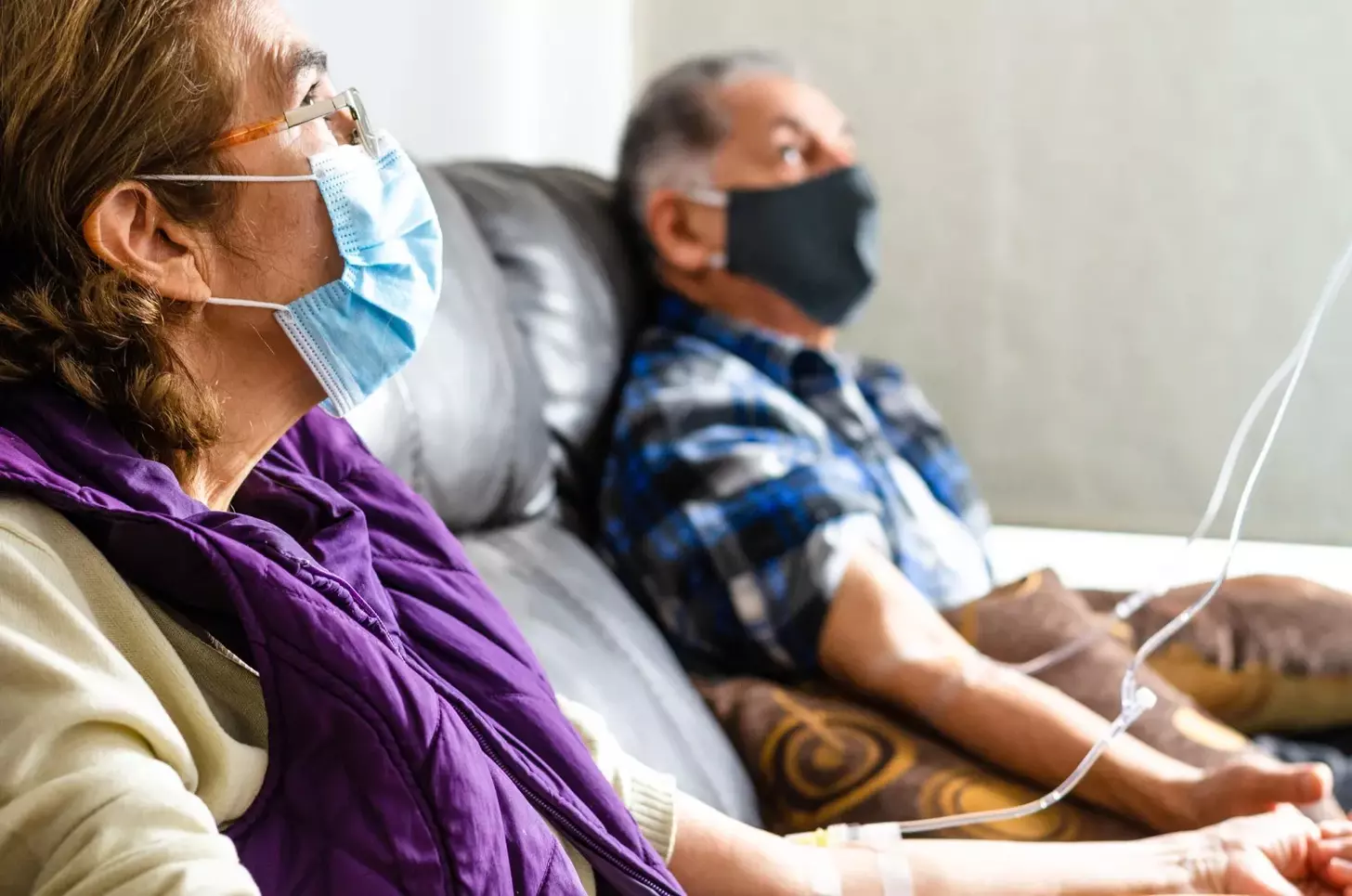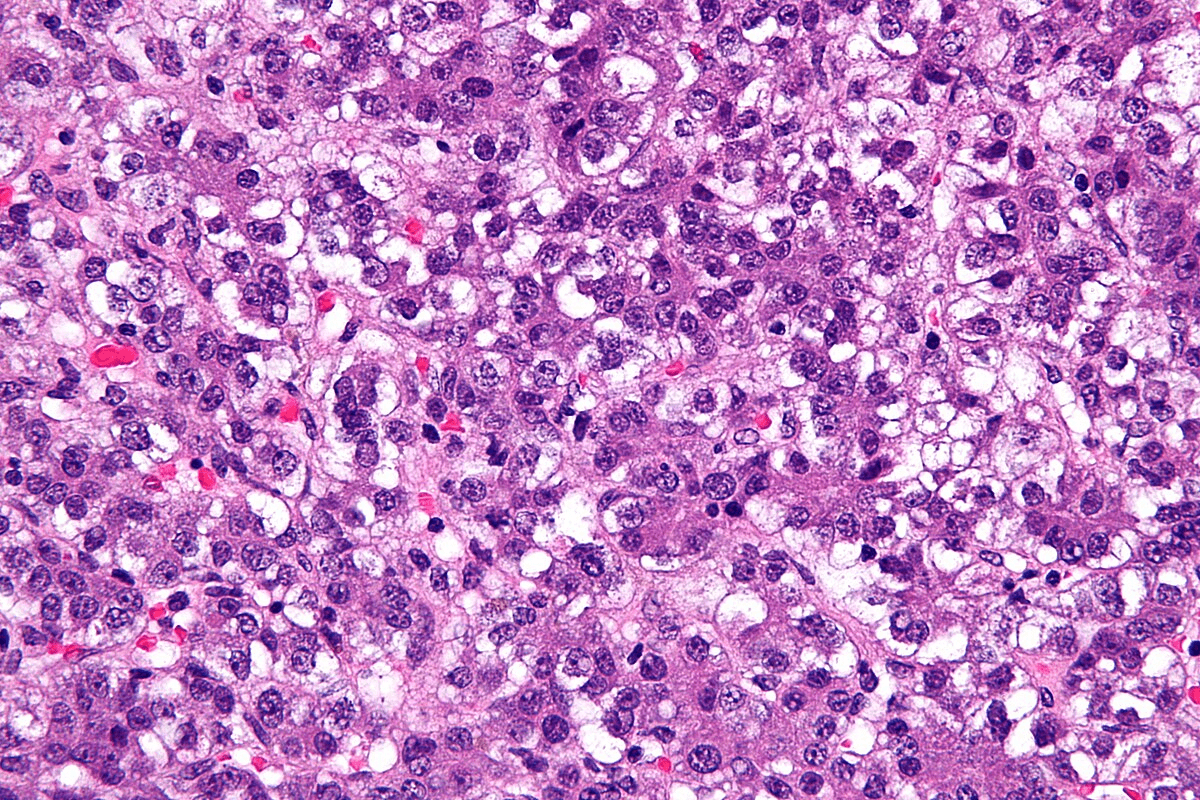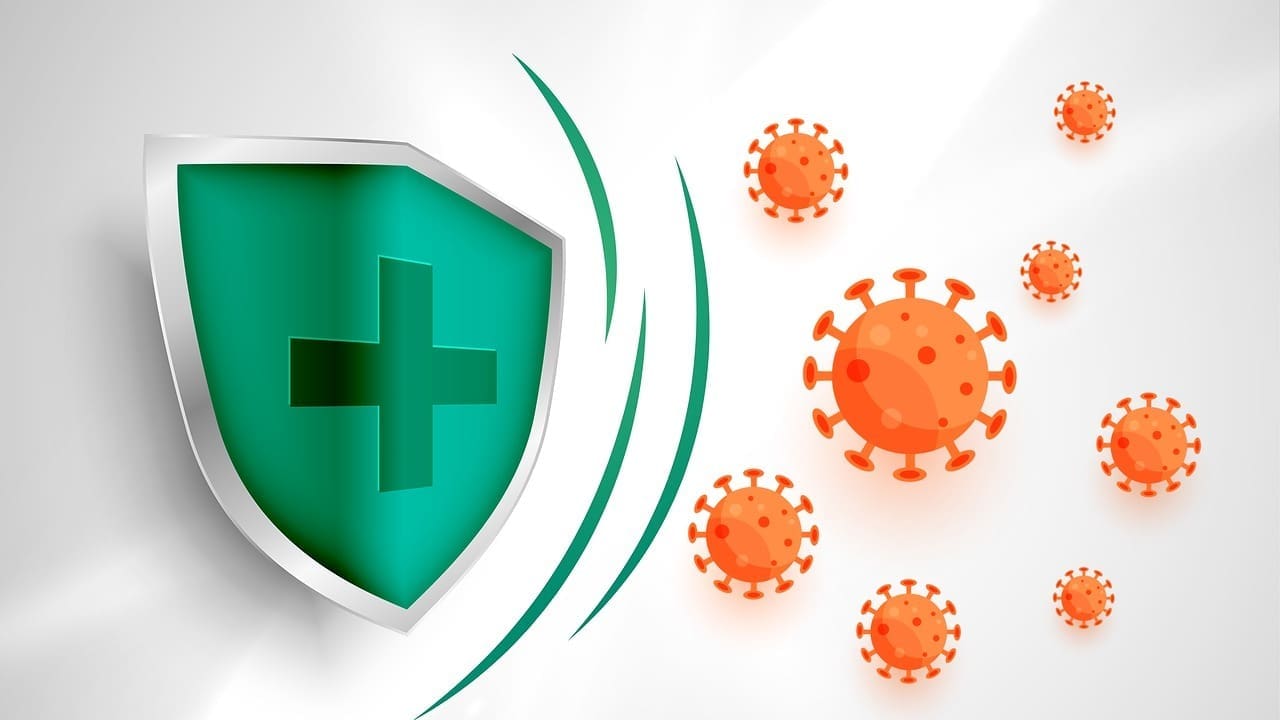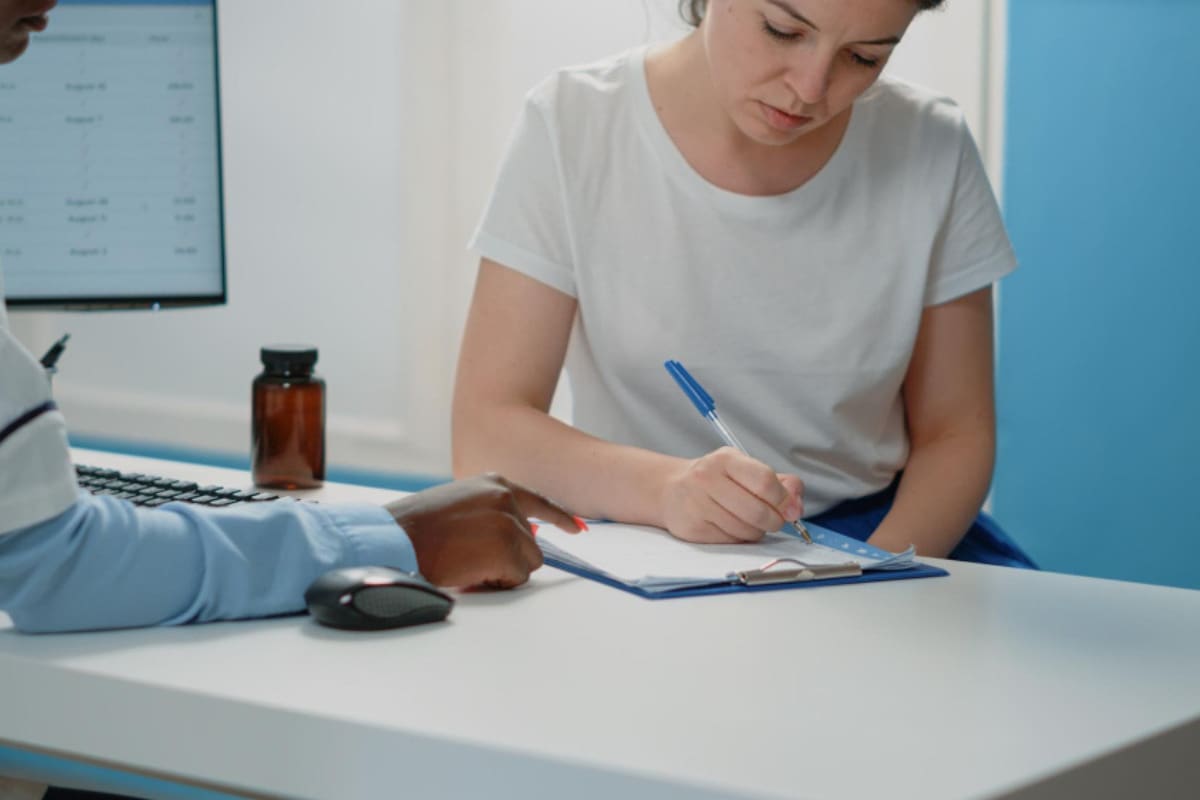Last Updated on November 27, 2025 by Bilal Hasdemir
The first time you see a cancer specialist can be scary. But knowing what to expect can make you feel better. Patients often ask, “What happens when you see an oncologist for the first time? since this visit sets the tone for their treatment journey.
Every year, millions of people in the United States get cancer. Seeing a cancer doctor for the first time is a big step. It’s important for figuring out what to do next.
At your first visit, the doctor will look over your medical history. They will talk about your diagnosis and what treatments you might have. Knowing what’s going to happen can help you feel more ready and in charge.
Key Takeaways
- Understanding the role of a cancer specialist in diagnosis and treatment.
- Preparing for the initial consultation by knowing what to expect.
- The importance of discussing treatment options with your doctor.
- Being informed can help reduce anxiety and make you feel more in control.
- The first visit is a critical step in your cancer journey.
Understanding the Role of an Oncologist

When you get a cancer diagnosis, knowing what an oncologist does is key. An oncologist is a doctor who focuses on cancer. They handle diagnosis, treatment, and managing cancer.
Oncologists are essential in cancer care. They create treatment plans that fit each patient’s needs. The field of oncology is broad, with many specialties working together for the best results.
Types of Oncologists and Their Specializations
There are different kinds of oncologists, each with their own focus. Here are a few:
- Medical Oncologists: They use treatments like chemotherapy and hormone therapy to fight cancer.
- Radiation Oncologists: They use radiation to kill cancer cells.
- Surgical Oncologists: These are surgeons who remove tumors and cancerous tissues.
Each oncologist brings their expertise to help patients. The right oncologist depends on the cancer type, its stage, and the patient’s health.
The Oncology Team Structure
The oncology team is more than just oncologists. It includes many healthcare professionals. This team might include:
- Nurses and nurse practitioners who care for patients and offer support.
- Pathologists who study tissue samples to make cancer diagnoses.
- Radiologists who read imaging tests like X-rays and MRIs.
- Social workers and counselors who help with emotional and psychological support.
This team works together to cover all aspects of care. They focus on medical treatment and emotional support. This way, they provide comprehensive cancer care that meets each patient’s needs.
Knowing about oncologists and the oncology team can make patients feel more in control. Whether it’s a medical, radiation, or surgical oncologist, these doctors aim to give the best care to their patients.
When You Need an Oncologist Consultation
Deciding to see an oncologist usually comes after getting suspicious test results or noticing strange symptoms. This important step can greatly affect how cancer is diagnosed and treated.
Common Referral Reasons
Usually, a doctor sends you to see an oncologist. Reasons include abnormal test results, symptoms that suggest cancer, or a past cancer diagnosis. For example, if a mammogram or biopsy finds cancer cells, you’ll need to see an oncologist.
Other signs like losing weight without trying, constant pain, or changes in bowel movements can also lead to a referral. Seeing an oncologist early is key for quick diagnosis and treatment planning.
The Referral Process Explained
The process starts with a visit to your primary care doctor or a specialist who thinks you might have cancer. They will send you to an oncologist for more checks and to plan your treatment.
When you’re referred, your doctor will give your medical records to the oncologist. This helps the oncologist understand your situation and create a good treatment plan.
- The primary care physician or specialist identifies the need for an oncologist consultation.
- The patient is referred to an oncologist, and relevant medical records are transferred.
- The oncologist evaluates the patient’s condition and develops a treatment plan.
Scheduling Your First Oncology Appointment
Setting up your first oncology appointment involves a few key steps. You need to think about wait times and insurance. Knowing these can help you get ready and feel less stressed.
Typical Wait Times for New Patients
Wait times for oncology visits can change a lot. They depend on where you are, the doctor’s schedule, and how urgent your case is. Wait times can be anywhere from a few days to weeks.
Here’s a quick look at typical wait times:
| Urgency Level | Typical Wait Time |
| Emergency/Urgent | 1-3 days |
| High Priority | 1-2 weeks |
| Routine | 2-6 weeks |
Insurance and Financial Considerations
Before you book your appointment, it’s important to know about your insurance and costs. Many oncologists’ offices have staff to help with these financial details.
Some things to keep in mind are:
- Check if the oncologist is in-network with your insurance
- Know the copayment or coinsurance rates for your visit
- Ask about any extra costs for tests or procedures
- Look into financial help if you’re uninsured or underinsured
Being informed about these can help you plan better for your visit. This way, you can focus more on your health.
When you’re ready to book, have your insurance and personal info ready. Also, ask about wait times and what you can do before your visit. This will help you make the most of your time with the oncologist.
Preparing for Your First Visit
To make the most of your first oncologist visit, being well-prepared is key. You need to gather important medical records and organize your personal info. This helps your oncologist understand your situation better.
Medical Records to Gather
Getting all your medical records ready is a big step. These should include:
- Previous medical diagnoses and treatments
- Lab test results and imaging studies (e.g., X-rays, CT scans, MRI)
- Pathology reports if you’ve had a biopsy
- List of medications you’re currently taking
- Information about any allergies or sensitivities you have
Having these records ready helps your oncologist work more efficiently.
| Record Type | Description | Importance |
| Previous Diagnoses | Details of previous medical conditions | Helps understand medical history |
| Lab Test Results | Results of blood tests, imaging studies | Crucial for diagnosis and treatment planning |
| Medication List | List of current medications | Essential for avoiding drug interactions |
Personal Information to Organize
Organizing your personal info is also important. This includes:
- Family medical history, focusing on cancers
- A detailed list of your symptoms, including when they started and how they’ve progressed
- Any questions or concerns you have about your condition or treatment
Being ready with this info lets your oncologist give you more tailored care.
By getting your medical records and personal info ready, you’ll be set for your first oncologist visit. This preparation ensures your oncologist has everything they need. They can then give you an accurate diagnosis and create a treatment plan that works for you.
What to Bring to Your First Oncologist Appointment
To make your first oncologist visit a success, gather all important medical records and info ahead of time. Being ready helps your oncologist understand your situation better. This way, they can make the best decisions for your care.
Essential Documents and Information
For your first oncologist visit, bring these documents and info:
- Medical Records: Include any important medical history, like past diagnoses, treatments, and test results.
- Imaging Studies: Bring any imaging studies like X-rays, CT scans, MRI scans, or PET scans.
- Pathology Reports: If you’ve had a biopsy, bring the pathology report.
- List of Medications: Provide a detailed list of your current medications, including dosages and how often you take them.
- Family Medical History: Share your family’s medical history, focusing on cancers, as it can be helpful.
Support Person Considerations
Having a support person at your first oncologist visit is very helpful. They can offer emotional support, help remember important details, and even ask questions for you.
When choosing a support person:
- Choose Someone Trustworthy: Pick someone you trust to be with you.
- Brief Them Ahead: Tell them about your condition and what you plan to discuss.
- Discuss Their Role: Decide if they should take notes or ask questions for you.
Being well-prepared with the right documents and having a support person makes your first oncologist visit more effective. It sets a positive start for your cancer care journey.
The Oncologist Consultation Process
Learning about the oncologist consultation process can ease your worries. It helps you get ready for your first visit. This first step is key in your fight against cancer.
Initial Paperwork and Registration
First, you’ll do some paperwork and register. This is important to keep your medical records current. It makes sure your oncologist has all the info they need about your health.
- Medical History Forms: You’ll fill out forms about your health history, including past illnesses and allergies.
- Insurance and Billing Information: You’ll share your insurance info and talk about any costs related to your care.
- Consent Forms: Before any treatment, you’ll sign consent forms.
Meeting the Oncology Team
After the paperwork, you’ll meet the oncology team. This includes your oncologist, nurses, and other healthcare experts. They will explain your diagnosis, treatment choices, and care plan.
The oncology team is essential in your cancer care. They offer medical treatment, emotional support, and guidance on your journey.
- Your Oncologist: The oncologist is a cancer specialist who will diagnose and treat your cancer.
- Nurses and Nurse Practitioners: They provide care, answer questions, and help manage symptoms and side effects.
- Other Specialists: You might also meet specialists like radiologists or surgeons, depending on your needs.
The oncologist consultation is a detailed process aimed at giving you the best care. Knowing what to expect can make you feel more ready and confident as you face your cancer journey.
Duration of First Oncology Appointments
Many patients wonder how long their first oncology appointment will last. The answer depends on several factors. This initial consultation is key to understanding your diagnosis and exploring treatment options.
Typical Timeframes to Expect
The length of your first oncology appointment can vary. It can last from 30 minutes to several hours. On average, you should plan to spend about 1-2 hours at the oncologist’s office for your first visit.
Factors That May Extend Your Visit
Several factors can affect how long your first oncology appointment lasts. These include:
- The complexity of your case
- The need for additional testing or examinations
- The amount of paperwork and initial registration required
- The oncologist’s need to review your medical history in detail
Complex cases may need more time for discussion and planning. If extra tests are required, this can also make your visit longer. It’s important to be ready for the possibility of a longer appointment.
Knowing these factors can help you manage your expectations for your first oncologist appointment. Being aware of what to expect can reduce anxiety and make the process smoother.
The Medical History Review
A detailed medical history review is key for your oncologist to understand your condition. They need to know your past health, current status, and family history. This helps them create an effective treatment plan for you.
Discussion of Your Symptoms and Diagnosis
At your first oncology specialist appointment, your oncologist will talk about your symptoms and past diagnoses. It’s important to share all details about your symptoms. This includes when they started, how severe they are, and what makes them better or worse.
Be prepared to share any previous treatments, medications, or health issues. This information helps your oncologist make the best decisions for your care.
Family History Assessment
Looking into your family history is a big part of the review. Your oncologist will ask about any cancer or health issues in your family. This can give clues about genetic factors that might be affecting you.
Knowing your family history helps with cancer staging and finding the right treatment. Be ready to talk about your parents’, siblings’, and children’s health.
By reviewing your medical history, symptoms, diagnosis, and family history, your oncologist gets a full picture of your condition. This information is essential for creating a treatment plan that fits your needs.
Physical Examination During Your First Visit
A thorough physical exam is key when you first see an oncologist. It helps spot any signs that might mean cancer. This step is vital for the oncologist to check your health and find any issues that need more looking into.
What the Oncologist Looks For
The oncologist will check your body for any odd signs or symptoms during the exam. They look for abnormal masses or swelling, skin color or texture changes, and other signs of health problems. They also check your weight, blood pressure, and other important signs.
They’ll also check your lymph nodes closely. Cancer often spreads through these nodes. They’ll examine the area where they think cancer might be, looking for any signs of it.
Additional Tests That May Be Ordered
After the exam, the oncologist might want to do more tests to confirm cancer. These could include imaging studies like X-rays, CT scans, MRI scans, or PET scans. These help see inside your body and spot any problems.
They might also do laboratory tests, like blood tests or biopsies. These tests help find out if you have cancer, what kind it is, and how far it has spread.
- Imaging studies to visualize internal structures
- Laboratory tests, including blood tests and biopsies
- Other diagnostic procedures as necessary
By using what they find from the exam and these tests, the oncologist can understand your situation better. Then, they can make a good plan to treat you.
Understanding Your Diagnosis
Getting to know your cancer diagnosis is key. It shapes your treatment and care. Your oncologist will explain it in simple terms.
Cancer staging is vital. It shows how far the cancer has spread and guides treatment.
How Oncologists Explain Cancer Staging
Cancer staging looks at the tumor size, lymph node spread, and body spread. Your oncologist will give your cancer a stage, from I to IV.
The staging process is important. It helps your oncologist create a treatment plan just for you. Early cancers might need surgery or radiation. More advanced cancers might get chemotherapy.
Interpreting Pathology Reports
A pathology report comes from your biopsy or surgery. It tells you about your cancer type, grade, and stage.
Your oncologist will check several things in your report. They look at cancer cell type, grade, and margins. They also check for genetic mutations.
Knowing these details helps you understand your diagnosis and treatment.
At your oncologist consultation, you can talk about your diagnosis and options. This is a great time to ask questions and clear up any confusion.
Treatment Planning Discussions
Starting your cancer treatment plan begins with a detailed talk with your oncologist. This is a key step. You’ll learn about your diagnosis, the different treatment choices, and decide on your care.
Overview of Treatment Options
Cancer treatment varies based on the type, stage, and your health. Your oncologist will talk about the best options for you. These might include:
- Surgery: To remove tumors or affected tissues.
- Chemotherapy: Using drugs to kill cancer cells.
- Radiation Therapy: High-energy rays to target cancer cells.
- Immunotherapy: Boosting your immune system to fight cancer.
- Targeted Therapy: Drugs that target specific cancer cell characteristics.
- Hormone Therapy: For cancers influenced by hormones.
Knowing these options helps you make informed choices about your treatment.
Decision-Making Process
Deciding on treatment involves your oncologist, you, and sometimes family or caregivers. It’s a team effort. You’ll consider your wishes, the cancer’s details, and the good and bad of each option.
| Treatment Option | Key Considerations | Potential Benefits |
| Surgery | Risk of complications, recovery time | Removal of tumor, possible cure |
| Chemotherapy | Side effects, treatment duration | Killing cancer cells, lower risk of coming back |
| Radiation Therapy | Side effects, treatment schedule | Directly kills cancer cells |
Your oncologist will help you through this. They’ll give you all the details and support you need to choose the best care for you.
Essential Questions to Ask at Your First Oncology Appointment
When you first meet an oncologist, it’s key to ask the right questions. This helps you understand your diagnosis and treatment choices. It’s a chance to get answers, clear up any confusion, and start a relationship with your doctor.
To get the most from this meeting, prepare your questions ahead of time. Focus on these important areas:
Questions About Your Diagnosis
Knowing your diagnosis is the first step in making informed decisions. Ask:
- What type of cancer do I have, and what stage is it?
- Can you explain my pathology report and what it means?
- Are there any additional tests needed to confirm the diagnosis or understand the extent of the cancer?
Clarifying your diagnosis helps you grasp the extent of your condition. It also explains why your doctor recommends certain treatments.
Questions About Treatment Options
After understanding your diagnosis, it’s time to explore treatment options. Ask:
- What are the recommended treatment options for my type and stage of cancer?
- What are the benefits and risks of each treatment?
- Are there any clinical trials or new treatments available that I might be eligible for?
Discussing treatment options with your oncologist helps you make informed decisions. It also prepares you for what to expect during treatment.
Some patients might also want to ask about supportive care options. This includes pain management, nutritional counseling, or emotional support services. These can help you cope with treatment.
“The most important thing for patients is to be informed and empowered to make decisions about their care. Asking the right questions can make a significant difference in their journey.” –
Oncology Expert
Virtual Oncologist Consultation Options
Telemedicine has made it easier for patients to talk to oncologists from home. This change makes cancer care more accessible. It’s great for those who have trouble moving or live far from doctors.
Telemedicine for Cancer Care
Telemedicine uses technology to offer healthcare services from afar. For cancer patients, it means talking about treatments and managing side effects without going to the doctor’s office. Telemedicine for cancer care is growing in popularity. It’s convenient and helps avoid infections in clinics.
Benefits of Telemedicine in Cancer Care:
- Less need to travel, saving time and money
- More access for those in remote or underserved areas
- Flexibility in scheduling
- More frequent monitoring and follow-up
Maximizing Virtual Appointment Effectiveness
To make the most of a virtual oncologist visit, preparation is essential. Make sure you have a good internet connection and a quiet, private space. Also, have the right devices, like a computer or tablet, with a camera and microphone. It’s a good idea to write down questions and concerns before the appointment.
During the visit, be ready to talk about your medical history, symptoms, and treatments. Clear communication is key. Don’t be afraid to ask for clarification if you don’t understand something.
By knowing how to use virtual consultations well, patients can get top-notch care from their oncologists, even from a distance.
Managing Emotions During Your First Visit
When you get a cancer diagnosis, it’s important to be emotionally strong. Knowing how to handle your feelings during your first visit with an oncologist is key. This first meeting can be tough, both physically and emotionally.
Common Emotional Responses
During your first visit, you might feel many things. You could feel shocked, deny the news, be anxious, or scared about what’s ahead. It’s important to remember that these feelings are normal and okay.
- Shock and Denial: Many patients feel numb or can’t believe the news.
- Anxiety and Fear: Worries about treatment, how you’ll do, and how it will affect your loved ones are common.
- Anger and Frustration: Some people get angry or frustrated with their situation or the medical process.
Coping Strategies and Resources
It’s vital to find ways to cope with your emotions during this tough time. There are many resources and support systems available to help.
Coping Strategies:
- Reach out to family, friends, or join a support group.
- Try relaxation techniques like meditation or deep breathing.
- Learn as much as you can about your diagnosis and treatment options.
Support Resources include professional counseling, online forums, and educational materials about cancer. Using these can help you on your emotional journey.
By understanding your emotional responses and using effective coping strategies, you can handle your feelings during your first oncologist visit and beyond.
Next Steps After Your Initial Consultation
Knowing what comes after your first talk with an oncologist can ease worries. Your oncologist will likely share a plan for more tests and treatment after your first meeting.
Follow-up Appointments
Follow-up visits are key in your fight against cancer. They let your oncologist check on you, tweak your treatment if needed, and talk about any worries you have. Make sure to keep up with your schedule and come ready with questions or any new symptoms.
To prepare for follow-up appointments:
- Review your treatment plan and any previous test results.
- Write down your questions and concerns.
- Bring a support person if needed.
Additional Testing and Referrals
You might need more tests to get a clearer picture of your health or to see how well your treatment is working. Your oncologist could order tests like imaging or biopsies. You might also see other doctors for more care or advice.
Feeling nervous about more tests or seeing other doctors is normal. But these steps are important for your care. Your oncologist will tell you why you need each test or referral and help you through it.
By knowing what to expect after your first talk, you can handle your cancer treatment better. Being informed and talking openly with your oncologist is vital for the best care.
Seeking a Second Opinion
Getting a second opinion from another oncologist can give you new insights into your treatment plan. This is very helpful when dealing with complex conditions like cancer.
Many people seek a second opinion to feel more confident in their care. It can also help find other treatment options. Knowing when and how to ask for a second opinion is key.
When to Consider Another Oncologist
There are times when getting a second opinion is a good idea:
- Unclear Diagnosis: If you’re not sure about your diagnosis or cancer stage, another opinion can clear things up.
- Treatment Options: If you’re not happy with your treatment plan or want to explore other choices, a second opinion can help.
- Rare or Complex Cases: For rare or complex cancers, a specialist’s opinion can be very helpful.
Also, if you’re unsure or uncomfortable with your current treatment, getting a second opinion can be empowering. Knowing more about your treatment can greatly impact your journey.
How to Request Medical Records
To get a second opinion, you need your medical records. Here’s how to get them:
- Ask your current healthcare provider for a copy of your medical records. This includes your diagnosis, test results, and treatment plans.
- Make sure you have all important documents, like pathology reports and imaging studies.
- Find out how your healthcare provider transfers records to other doctors or places.
Having your medical records ready makes getting a second opinion easier. It ensures the new oncologist has all the info they need for a thorough consultation.
Seeking a second opinion is a smart move in managing your cancer treatment. By knowing when and how to ask for your medical records, you can make better decisions about your care.
Conclusion
Your first oncologist consultation is key to understanding your cancer diagnosis. It helps in creating an effective treatment plan. Being prepared for this visit is important for a successful recovery journey.
At your oncologist consultation, your doctor will go over your medical history. They will discuss your diagnosis and the treatment options available. It’s important to ask questions and clarify any concerns you have.
When looking for an oncologist near me, consider their specialization and experience. Your cancer doctor consultation is about more than just treatment. It’s about getting care that supports your physical, emotional, and mental health.
Knowing what to expect and being ready for your first visit can empower you. Your oncologist is a vital partner in your cancer journey. They offer guidance, support, and expertise to help you face the challenges ahead.
FAQ
What is an oncologist, and what do they do?
An oncologist is a doctor who deals with cancer. They help patients with different types of cancer. They create treatment plans that are just right for each patient.
How long is the first oncology appointment?
The first visit can last from 30 minutes to several hours. It depends on how complex the case is and how much to discuss.
What should I bring to my first oncology appointment?
Bring all your medical records, like test results and biopsy reports. Also, list your medications, allergies, and any questions you have.
What happens during the first oncology appointment?
The oncologist will look over your medical history and talk about your symptoms. They will also do a physical exam. They might order more tests to find the best treatment.
How do I prepare for my first oncology appointment?
Get all your medical records ready. Organize your information and make a list of questions. It’s a good idea to bring someone you trust with you.
What are the different types of oncologists, and what are their specializations?
There are many types of oncologists. Medical oncologists use medicine to treat cancer. Radiation oncologists use radiation therapy. Surgical oncologists remove tumors surgically.
Can I get a second opinion from another oncologist?
Yes, getting a second opinion is common. Talk to your current oncologist about it. They can help get your medical records.
How do oncologists communicate diagnosis and cancer staging to patients?
Oncologists explain your diagnosis and cancer stage clearly. They use simple words to help you understand. They also give written information and resources for support.
What are the benefits of virtual oncologist consultations?
Virtual consultations are convenient and can save money. They’re great for those who have trouble getting to appointments or live far away.
How can I manage my emotions during my first oncology appointment?
It’s okay to feel emotional. Having someone with you, asking questions, and seeking support can help. Talk to loved ones or a therapist if you need to.
What are the next steps after the initial oncology consultation?
After the first visit, you’ll have follow-up appointments and tests. The oncologist will discuss treatment options and create a plan for you.






